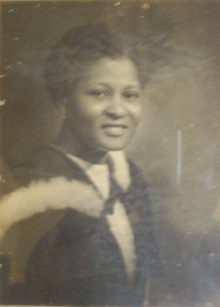Matilda Johanna Clerk | |
|---|---|
 Matilda Clerk in Edinburgh, 1949 | |
| Born | Matilda Johanna Clerk 2 March 1916 |
| Died | 27 December 1984 (aged 68) |
| Nationality |
|
| Education | |
| Occupations | |
| Known for |
|
| Parents |
|
| Relatives |
|
| Awards | Gold Coast Medical Scholar |
| Medical career | |
| Field | |
Matilda Johanna Clerk (2 March 1916 – 27 December 1984) was a medical pioneer and a science educator on the Gold Coast and later in Ghana as well as the second Ghanaian woman to become an orthodox medicine-trained physician.[1][2] The first woman in Ghana and West Africa to attend graduate school and earn a postgraduate diploma, Clerk was also the first Ghanaian woman in any field to be awarded an academic merit scholarship for university education abroad.[1][3] M. J. Clerk was the fourth West African woman to become a physician after Nigerians, Agnes Yewande Savage (1929), the first West African woman medical doctor and Elizabeth Abimbola Awoliyi (1938) in addition to Susan de Graft-Johnson, née Ofori-Atta (1947), Ghana's first woman physician.[1][4][5][6][7][8] These pioneering physicians were all early advocates of maternal health, paediatric care and public health in the sub-region.[1][4][9][10] For a long time after independence in 1957, Clerk and Ofori-Atta were the only two women doctors in Ghana.[3] By breaking the glass ceiling in medicine and other institutional barriers to healthcare delivery, they were an inspiration to a generation of post-colonial Ghanaian and West African female doctors at a time the field was still a male monopoly and when the vast majority of women worldwide had very limited access to biomedicine and higher education.[1][3] Pundits in the male-dominated medical community in that era described Matilda J. Clerk as "the beacon of emancipation of Ghanaian womanhood."[3][11]
- ^ a b c d e Patton, Adell Jr. (13 April 1996). Physicians, Colonial Racism, and Diaspora in West Africa. University Press of Florida. p. 29. ISBN 9780813014326.
- ^ Ferry, Georgina (November 2018). "Agnes Yewande Savage, Susan Ofori-Atta, and Matilda Clerk: three pioneering doctors". The Lancet. 392 (10161): 2258–2259. doi:10.1016/S0140-6736(18)32827-7. ISSN 0140-6736. S2CID 53713242.
- ^ a b c d Clerk, Nicholas T. (5 January 1985). "Obituary: Dr. Matilda Johanna Clerk, MBChB, DTM&H". Presbyterian Church of Ghana Funeral Bulletin. Accra.
- ^ a b "CAS Students to Lead Seminar On University's African Alumni, Pt. IV: Agnes Yewande Savage". Postgrads from the Edge. 16 November 2016. Archived from the original on 5 August 2017. Retrieved 5 August 2017.
- ^ Mitchell, Henry. "Dr Agnes Yewande Savage - West Africa's First Woman Doctor (1906-1964)" (PDF). Centre of African Studies. Archived (PDF) from the original on 1 June 2018.
- ^ "Tabitha Medical Center | Celebrating African Women in Medicine". www.tabithamedicalcenter.com. Archived from the original on 6 December 2017. Retrieved 20 February 2018.
- ^ Anibaba, Musliu Olaiya (2003). A Lagosian of the 20th century: an autobiography. Tisons Limited. ISBN 9789783557116. Archived from the original on 23 December 2016.
- ^ "National Commission On Culture". ghanaculture.gov.gh. Archived from the original on 22 July 2015. Retrieved 20 February 2018.
- ^ Joeden-Forgey, Elisa von (1 August 1997). "How Europe Underdeveloped African Medicine (review of Patton, Adell Jr., Physicians, Colonial Racism and Diaspora in West Africa)". www.h-net.org. Archived from the original on 30 March 2017. Retrieved 11 April 2017.
- ^ Physicians, colonial racism, and diaspora in West Africa / Adell Patton, Jr. - Version details. Gainesville : University Press of Florida. 1996. ISBN 9780813014326. Archived from the original on 6 April 2017. Retrieved 11 April 2017 – via Trove.
- ^ Seck, Fatima. "Matilda J. Clerk – UncoverED". Archived from the original on 22 January 2019. Retrieved 22 January 2019.